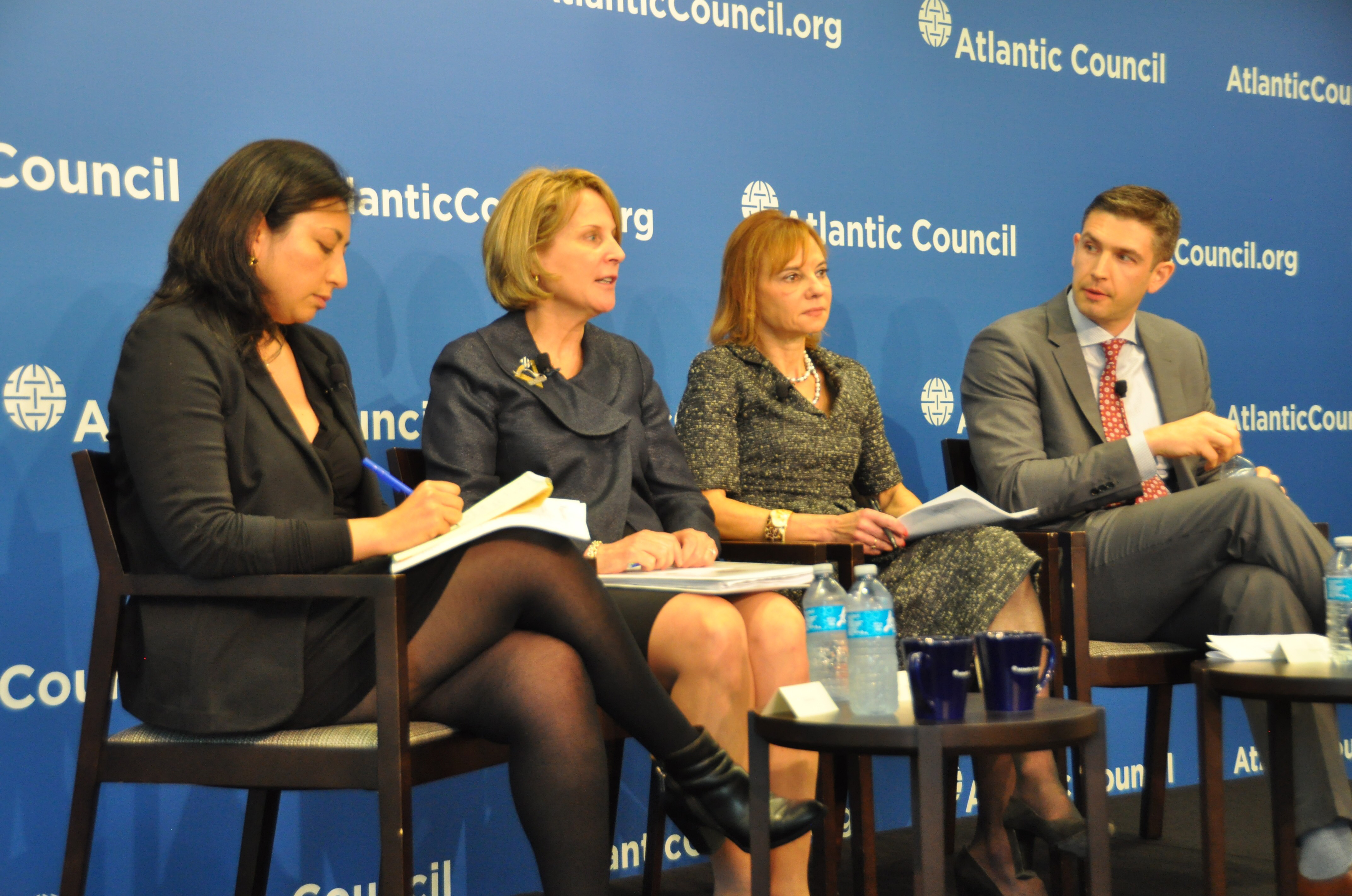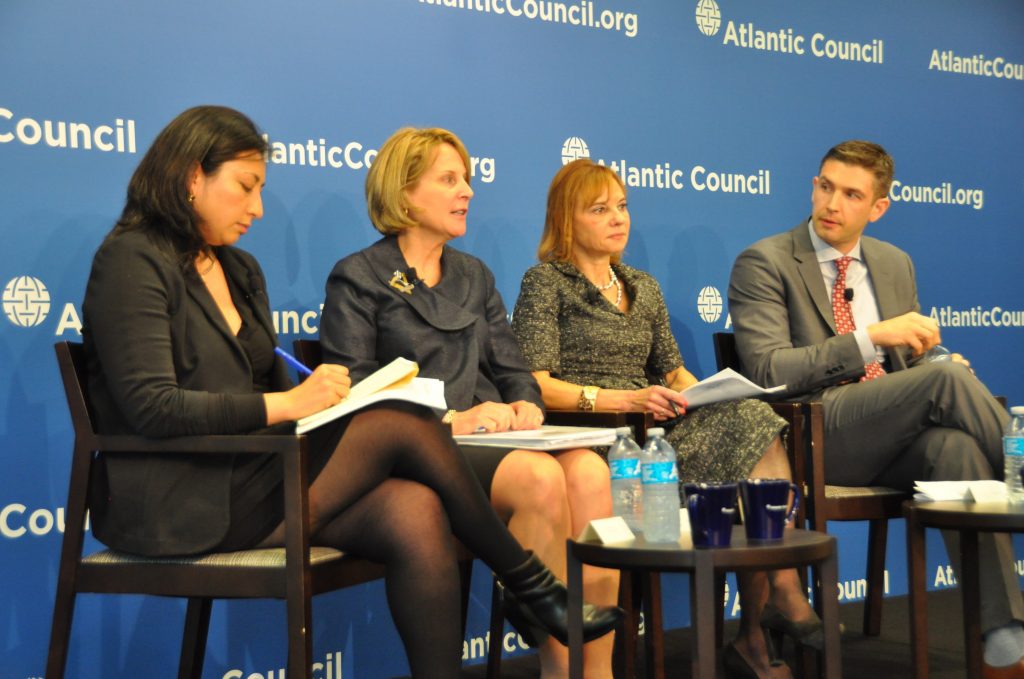 Climate change poses a monumental threat to national security, American prosperity, and global society, a panel of national security and insurance advisers agreed at the Atlantic Council on Nov. 5.
Climate change poses a monumental threat to national security, American prosperity, and global society, a panel of national security and insurance advisers agreed at the Atlantic Council on Nov. 5.
The panel discussion featured Judge Alice Hill, Senior Director for Resilience Policy at the National Security Council; Sherri Goodman, President and CEO of the Consortium for Ocean Leadership; and Alex Kaplan, Vice President of Global Partnerships at Swiss Re. Valerie Volcovici, climate and energy reporter at Reuters, moderated the discussion.
All three panelists were adamant that the world is at a pivotal point where political, economic, and social infrastructure must adapt to cope with a changing climate, or face the consequences – some of which have already arrived.
“With warmer oceans and higher seas, we can identify expected trends,” Hill said. “New York City can expect a Sandy-level flooding event to happen every twenty-five years.”
In 2012, Hurricane Sandy levelled communities throughout the east coast of the United States. With damage exceeding $75 billion, it was the world’s first insight into the damage a natural disaster can inflict on the world’s financial heart — and a sign of things to come, warned Hill.
The signs are everywhere, Hill explained. California is facing its worst drought ever, while the Carolinas recently saw a 1,000-year rainfall event. Two of the strongest tropical cyclones in recorded history — Haiyan in the Philippines and Patricia in Mexico — struck in 2013 and 2015, respectively.
But the impact of climate change goes far beyond the weather.
“Around the world, climate change, in all likelihood, increases the risk of instability and conflict,” Hill said. “The consequences of climate change could significantly challenge not only already fragile governments, but also stable governments.”
Climate change is already a leading culprit for kickstarting the war in Syria. Researchers are drawing links between the impacts of an extreme drought in the years just before the outbreak of fighting in 2011. In Nigeria, a severe drought might be at least partly to blame for the rise of the Islamist extremist group Boko Haram.
The situation isn’t any brighter for the estimated 100 million people around the world who live near the shore, prone to sea level rise. With projections warning the world could soon see millions of “climate refugees,” the onus is on world leaders to set global society on the right course to mitigate the effects of climate change, starting in Paris later this month.
“I am very optimistic … I think that you will see a commitment from the United States to keep going back at this, to make sure that we are leaving the world a safer place for our children,” Hill said. “There is absolute determination to get this right, and that’s from the very highest level.”
The panel, “Climate Change, Economic Resilience, and US National Security,” was the latest in the Atlantic Council’s “Road to Paris” climate Series ahead of the 2015 United Nations Climate Change Conference to be held in Paris from Nov. 30 to Dec. 11.
Looking for Answers in the World’s Oceans
To build a better society, according to Goodman, we need to understand the oceans.
The reality is that the ocean is growing too warm and too acidic. A warmer sea means stronger storms for those on land to contend with, while acidic water risks killing off the creatures that call it home – and the world’s delicate food web.
“There is a growing information gap about the oceans … it’s one that requires cooperation, not competition, to resolve,” said Goodman. “We are about to enter the era of global ocean observations, where we’ll be able to observe and monitor the oceans in new ways.”
That’s why Goodman, together with the Consortium for Ocean Leadership, is pushing researchers and educators to pursue a greater understanding of the way our oceans work.
“We need these observations both for research, and because we’re a global society dependent on the ocean for so much,” Goodman said. “We need more robust models that integrate oceans, climate, and social science data, and we need the political will to prioritize these needs and international cooperation across the board to accomplish them.”
Preparing Insurers for the Worst
Climate change also poses an enormous risk to the world’s financial infrastructure – specifically, according to Kaplan, the insurance sector.
The industry, Kaplan said, has failed. On average, 70 percent of the world’s economic loses are uninsured and fall on the backs of citizens, governments, and corporations.
Kaplan, part of a team at Swiss Re tasked with closing that “protection gap,” works closely with governments and international finance organizations like the World Bank to identify, quantify, and transfer loses from climate-related disasters off the backs of taxpayers and into the private market.
“The massive accumulation of wealth and assets in the most disaster-prone areas of the world are what are driving these economic losses to completely unsustainable levels,” Kaplan said.
After Sandy, Swiss Re found that New York City loses $1.7 billion on an annualized basis due to climate-related events.
As climate change worsens, those events only risk growing more intense and costly. Kaplan urged focus on determining what forms of investments will be required to fund measures to close the protection gap, and whether the benefits of that investment will outweigh the costs.
Alejandro Alvarez is an intern at the Atlantic Council.
Image: From left: Valerie Volcovici, a climate and energy reporter with Reuters, moderated a discussion at the Atlantic Council on Nov. 5 with Judge Alice Hill, Senior Director for Resilience Policy at the National Security Council; Sherri Goodman, President and CEO of the Consortium for Ocean Leadership; and Alex Kaplan, Vice President of Global Partnerships at Swiss Re. (Atlantic Council/Alejandro Alvarez)
